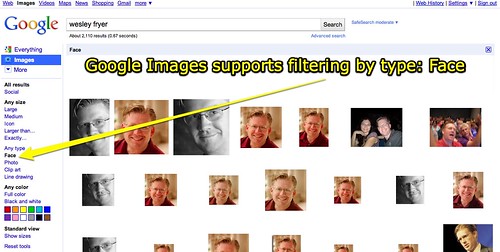There were lots of interesting announcements during Apple’s special event today in Cupertino. Among those I’ve seen so far reading coverage by Ars Technica is this:
In its newest iteration, iMovie ’11 is gaining a few features, some lifted from past versions of iPhoto. Apple has added a face-identifying feature to iMovie, similar to iPhoto’s Faces capability. iMovie can now search clips based on the particular person you’re looking for, and can also sort clips based on criteria like whether the clip is a group or single shot.
Law enforcement agencies and the military in many countries have had access to this kind of facial recognition technology (and much more advanced iterations I’m sure) for years. The integration of this into iMovie is simultaneously exciting, amazing, and more than a little “big-brotherish.” Last summer, during our Oklahoma Creativity Institute, I was intrigued to learn Google’s Picassa program (similar to iPhoto, but available free for both Windows and Apple users) also supports face recognition. I’m eager to give iMovie ’11 a try and test this facial recognition feature particularly.
According to Mike Melanson writing for ReadWriteWeb in July 2010, at that time (so this statistic is now out of date) about 100 million photos were being uploaded to Facebook EACH DAY, and 24 hours of video were being uploaded to YouTube each MINUTE. Facial recognition was announced for Facebook in July as a way to help users identify faces when tagging people, but does not automatically suggest tags / people’s names. I think that is still true, but we’re likely moving to a situation where photos as well as video posted online WILL be auto-tagged with identities. I’m sure law enforcement / military facial recognition systems DO offer that functionality today. In both iPhoto and Picassa, as you identify / tag individuals in photos the program “learns” how to recognize those faces and then suggests photos (which you can then confirm) which may also include those identified folks. Facebook doesn’t do this. Yet.
Michael Zimmer predicted in August 2010 Google’s face recognition capabilities will continue improve with profound privacy implications. It remains to be seen WHEN these facial recognition technologies will come to YouTube, but Google researchers presented about this capability back in mid-2009. Google Images supports filtering by type:face now. YouTube (as far as I know) does not. Yet.
On the subject of facial recognition and social networking, it’s good to know Facebook DOES support “untagging” of photos other people post. This article on eHow explains the steps. After you do this, the photo still remains on the poster’s Facebook page, but the image will NOT show up in your photos or Facebook profile page. This is good to know when discussing digital footprints and digital citizenship with students as well as adults.
On September 30th, Facebook announced they are rolling out new “bulk tagging” features which make it easier to tag the same person in a group of photos you upload to the site in a batch. I’m betting (but can’t confirm) this new “feature” also leverages the facial recognition capabilities developed by DivvyShot, which was acquired by Facebook in April.
Like many technological advances, facial recognition offers both advantages and drawbacks. While it can make identifying members of your family for a digital holiday video card easier, it will also make the identification and aggregation of photos taken of you by others easier online. From a privacy standpoint, this means everyone should continue to carefully consider what they share and post. As I write this, I must acknowledge I’m not nearly as discriminating and conservative as I once was about sharing family photos online. Where I used to password-protect all our online family photos and videos, now I share lots of photos as well as videos publicly on Flickr and YouTube. I think a big part of this is because I’m understanding Internet safety risks in better perspective thanks to my study of the work done by scholars like danah boyd and researchers like Nancy Willard. Publication of personal photos DOES leave a person (as well as others included in those photos / videos) open to potentially harmful media-based harassment. People can be mean and hateful, and sharing media openly can provide people with malicious intent with “raw material” to construct hurtful media messages. I’m not offering a sugar-coated view of this, or hopefully an overly reactionary view either. Given the incredible upload rates of both photos and videos today online, it’s unlikely privacy concerns are going to significantly stem the tide (or perhaps tsunami) of personal media images being shared online. Sharing is a good thing, and as Dean Shareski argued last week starting the 2010 K-12 Online Conference, a moral imperative for educators. Technologies like facial recognition add another layer to sharing, however, making it easier to identify and aggregate media search results. What is shared today may be preserved digitally forever, and it may be indexed by websites beyond our individual control to “untag” or remove.
We live in interesting times to say the least.
Technorati Tags:
apple, face, imovie, recognition
If you enjoyed this post and found it useful, subscribe to Wes’ free newsletter. Check out Wes’ video tutorial library, “Playing with Media.” Information about more ways to learn with Dr. Wesley Fryer are available on wesfryer.com/after.
On this day..
- Comments to the Oklahoma City Board of Education: Oct 20, 2014 – 2014
- 2013 Tablet Summit in Montreal: Your Table[t]d’hôte Today – 2013
- Great News for iPad Videographers (Open-In Audio Functionality Added to Pinnacle Studio) – 2013
- Introducing Your Next Educational Conference Speaker! – 2011
- The Fisch Flip in Michigan: Dale Eizenga on flipping traditional lecture and homework routines – 2010
- Is the E-Rate Program in the United States broken? – 2009
- Saturday morning in a 1 to 1 household – 2008
- Chris Lehmann on School Change at Ignite Philly – 2008
- More thinking about mobile, field recording for podcasts – 2007
- They’re not digital natives or immigrants – 2006



Comments
One response to “Facial Recognition in Software Programs and Online”
[…] Facial Recognition in Software Programs and Online « Moving at the Speed of Creativity Last summer, during our Oklahoma Creativity Institute, I was intrigued to learn Google’s Picassa program (similar to iPhoto, but available free for both Windows and Apple users) also supports face recognition. I’m eager to give iMovie ’11 a try and test this facial recognition feature particularly. (tags: recognition facial software picassa) […]